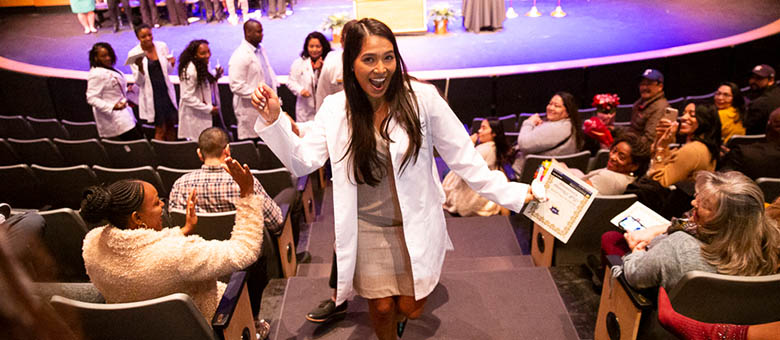This material was written by a DCCCD licensed counselor. All views expressed in this piece are their own and do not necessarily reflect the views of DCCCD.
Most of us have spent much more time alone than usual over the past few months. It has been lonely at times and stressful as well.
There is a possible positive, however.
This alone time gives you the opportunity to get to know someone who is critical to your health and success — yourself. Being alone a lot can bring up old messages such as, “you’re not good enough, smart enough, pretty enough or interesting enough” or “you’re bad in some way or lack something.” But it can also be a time to learn to accept yourself (strengths and weaknesses), like yourself, maybe even love yourself.
Most people can point out their flaws very quickly. We are all too aware of those — and people love to point them out for us! But when I ask students to list the things they like about themselves, they often have a hard time pointing out true positives (not bad things they don’t do). All of us have things we are pretty good at (not at a professional level, maybe, but pretty good) — cooking, crafts, good with animals, sports, singing or playing an instrument, growing things, dancing, art, fixing or making things, etc. And all of us have nice qualities to our personalities — listen well, kind, like to help, make people laugh, people can count on us, loyal, etc.
We may not like to brag in front of people, but in our own rooms, maybe late at night or early in the morning when the house is quiet, we can sit and think of these things and write them down. Let’s assume we all have things we don’t like about ourselves. (We are human, after all, and no human is perfect.) But let’s leave those off this list.
If you met someone with the attributes on this list, wouldn’t you think they would be nice to know, nice to be around, maybe interesting? Often, we don’t think people will like us, so we don’t show them all the good things about us. We don’t give them a chance to like us as much as they might have.
Think of yourself as the person on your list and get to know that person. Do more of the things you are good at and find interesting. Let yourself really enjoy them. Share more of those nice qualities with other people. And pay attention – listen to your feelings and needs, learn to help yourself, get yourself to laugh more, learn to count on yourself. You’ll see what a likable person you really are!
Learning to like or even love yourself is a journey, not something you do all at once or just one time. Do these things daily. Add to your list as you find more things about you that are positive.
Helpful and Fun Resources
- How To Love Yourself (with cool drawings!)
- Why You Should Learn To Love Yourself and 7 Steps to Healthy Self-Love
- 17 Ways To Learn To Love Yourself
DCCCD Online Counseling for Students
Safe and secure mental health counseling sessions are now available for currently enrolled students through a virtual meeting platform called Webex.
Interested in scheduling an online counseling appointment? To get started, contact your campus Counseling Center at the email address listed below. From there, a member of your campus Counseling Center team will provide you a link to complete and submit your intake and consent forms. Please allow yourself about 15-20 minutes to complete them online. After submitting the forms, you will be able to schedule an appointment with a counselor.
When you schedule an appointment, a member of the Counseling Center team will email you a Webex calendar invite with the time and date for your session. Please click on the unique link in the calendar invite to join by video, or call the number provided to speak with the counselor by phone at the scheduled time.
Brookhaven Counseling Center: bhccounseling@dcccd.edu
Cedar Valley Counseling Center: cvccounseling@dcccd.edu
Eastfield Counseling Center: jasminegarcia@dcccd.edu
El Centro Counseling Center:ECCStudentCounseling@dcccd.edu
Mountain View Counseling Center: jgonzalez@dcccd.edu
North Lake Counseling Center:nlccounseling@dcccd.edu
Richland Counseling Center:Counseling-RLC@dcccd.edu
Please note: If you are experiencing a mental health crisis, please call 911 or visit the nearest hospital emergency room rather than requesting an online counseling session.
Community Mental Health Resources
If you feel the need to speak to someone outside the district, please explore the many community mental health resources available in our area:
- North Texas Behavioral Health Authority can help pay for community psychiatric, mental health and substance abuse services — please call 214-366-9407.
- Suicide and Crisis Center of North Texas — please call 214-828-1000.
- National Veterans Crisis Line — please call 800-273-8255 and press 1.
- National Domestic Violence Hotline — please call 800-799-7233.
- National Sexual Assault Hotline — please call 800-656-4673.
- Message 741741 from anywhere in the United States to text with a trained crisis counselor. Heads up — standard messaging rates may apply.
It’s okay to say. If you see something that could be helpful to someone else, spread the word and share this information. Even if you’re not dealing with a specific mental health issue, chances are someone you know is.
